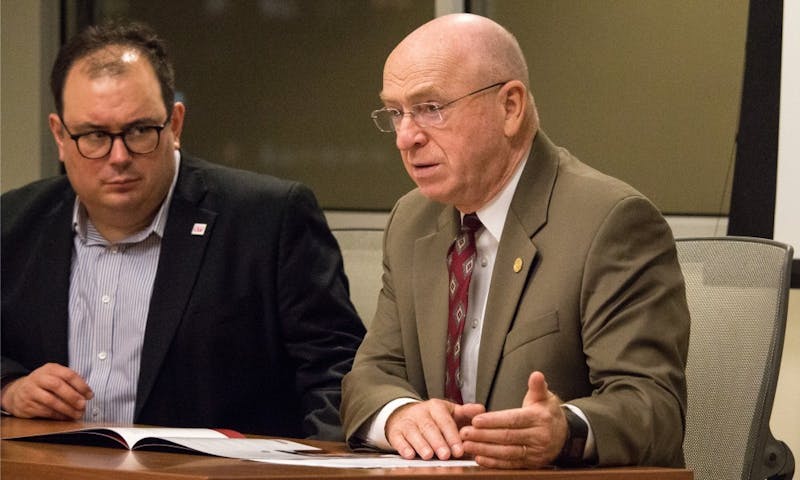
The proposed changes come as the UW System continues to grapple with loss of revenue and an uncertain future as it prepares itself for the potential ramifications of a post-COVID-19 environment.
Image By: Madeline Heim
The proposed changes come as the UW System continues to grapple with loss of revenue and an uncertain future as it prepares itself for the potential ramifications of a post-COVID-19 environment.
Image By: Madeline HeimIn anticipation of future financial losses related to the COVID-19 outbreak, UW System President Ray Cross directed campuses to cut academic programs and brace for layoffs Thursday.
Cross’ three-part plan entailed the consolidation and specialization of curriculum at individual campuses, the centralization of administrative services and increased usage of online classes.
“We’re facing some unprecedented challenges,” Cross said. “We’re trying to be responsible stewards. If we want the system to survive on the other side of this pandemic…we’ve got to act now.”
With the exception of UW-Madison and UW-Milwaukee, all UW System schools will be required to review and identify their most successful academic programs. Those found to be too costly, duplicative or low in demand will be considered for termination, pending approval from the UW Board of Regents.
The cuts would be enacted starting in the 2021-22 school year, which Cross called an “aggressive” timeline, the Wisconsin State Journal reported.
Schools will still be able to offer basic courses, like English and math, that undergraduates need to earn their degrees. However, the move to reduce redundancy in course catalogs among smaller UW campuses follows a prolonged trend — most notably in 2018 when UW-Stevens Point attempted to eliminate a number of its liberal arts programs — and a realization the UW System cannot support all 11 of its schools to be “all things to all people” institutions.
“If you look at the duplicated majors, are they necessary?” Cross asked. “Where do we need to focus the resources and energy of a campus in order to leverage its strengths without unnecessary duplication between campuses.”
Under the proposed scenario, students would major in a field their campus is renowned for and supplement their additional coursework in other areas by taking online classes, according to the Milwaukee Journal Sentinel.
While Cross said not every program would be cut — noting that some campuses could potentially experience greater reductions than others — and no UW System school was at risk of being closed, he acknowledged that employee layoffs would occur.
UW schools have already implemented employee furloughs to save money after facing $170 million in revenue loss for the spring semester alone due to reimbursing students for room and board and the costs of transitioning classes to online learning among others.
“We don’t know the impact of COVID-19, but there is a growing, clear sense that we must make serious reductions in order to be viable and to offer a quality education,” Cross said. “Layoffs will be inevitable.”
As schools expected to receive emergency relief funds from the federal CARES Act — $47 million in total — Gov. Tony Evers issued a 5 percent spending cut on state agencies and required a one-time payback by June. The UW System owes $45.7 million to the state Department of Administration, of which UW-Madison will assume $20 million of the burden. The costs, in turn, could negate much of the incoming assistance.
Coupled with an in-state tuition freeze, a budget that has shrunk by 6 percent since 2007-08 and uncertainty related to in-person classes in the fall, the financial strain exacerbated by the pandemic has accelerated long-term consequences.
To cope with the fallout, Cross stressed UW System leaders must assume a more centralized part in planning the future of the system’s curriculum, despite state statutes that require the Board of Regents to give individual campuses as much autonomy within institutional constraints.
“Given the need to accomplish this significant change rather quickly while balancing the interests of the state with the interests of each university, UW System Administration must play a larger role than planned under the previous incremental strategy,” Cross said.
Cross also proposed for system leaders to look for ways to streamline other administrative services, such as human resources and IT by the start of 2022, according to the Wisconsin State Journal.
In addition, Cross also pushed to increase the number of online courses offered to augment the system’s educational reach to accommodate both traditional and non-traditional students.
“Other national institutions have invested heavily in marketing their online programs while we have been hesitant,” Cross said. “We must accelerate now, or risk being left behind, perhaps for good.”